Did you know that converting your mobile home into real property can bring you numerous benefits? From increased value to improved financing options, this process can transform your manufactured home into a traditional house with legal recognition. But how exactly does the conversion work?
Converting a Mobile Home to Real Property
Converting your mobile home involves several steps, including obtaining a legal description and updating the title. By doing so, you establish your property as a permanent fixture on the land it sits on. This not only adds value but also opens up opportunities for financing options that may have been previously unavailable.

Imagine enjoying a porch attached to your newly converted home or being able to provide an accurate description of your property in any future transactions. The original title is replaced with an official statement reflecting the conversion, making it easier for potential buyers or lenders to assess their interest in your property.
Ready to explore how converting your mobile home can benefit you? Let’s dive into the process and discover just how valuable this decision could be for you and your investment.
Can a Manufactured Home Be Real Property?
If you own a manufactured home and are considering converting it to real property, there are certain criteria and legal requirements that you need to be aware of. Understanding the difference between personal property and real property status for mobile homes is crucial in this process. Let’s delve into the details to help you make an informed decision.
Find out if your manufactured home meets the criteria to be considered real property.
To determine whether your manufactured home can be converted into real property, you must assess if it meets specific criteria. These include:
Permanent foundation: Your home needs to have a permanent foundation, complying with local building codes and regulations. This ensures stability and permanence, distinguishing it from personal property.
Affidavit of affixture: You may need to file an affidavit of affixture with the appropriate authority in your jurisdiction. This document certifies that the manufactured home has been permanently attached to the land, further solidifying its status as real property.
Ownership of land: Typically, only homeowners who own the land on which their manufactured homes sit can convert them into real property. If you rent or lease the land, conversion might not be possible unless explicitly allowed by local laws.
Learn about the legal requirements and regulations governing this conversion process.
Converting a manufactured home into real property involves adhering to specific legal requirements and regulations set forth by your state or local government. Some common steps involved in this process include:
Researching local laws: Familiarize yourself with state-specific laws regarding mobile homes’ conversion to real property. Each jurisdiction may have different rules governing this process, so it’s essential to understand what applies in your area.
Obtaining permits: Depending on where you live, you might need permits or approvals from relevant authorities before converting your manufactured home into real property.
Hiring professionals: Engaging professionals such as surveyors, engineers, and attorneys with expertise in manufactured housing can be beneficial. They can guide you through the legal requirements and ensure compliance throughout the conversion process.
Understand the difference between personal property and real property status for mobile homes.
Differentiating between personal property and real property status is crucial when considering a conversion. Here’s what you need to know:
Personal property: When a manufactured home is classified as personal property, it is treated similarly to vehicles or other movable assets. It is not permanently attached to the land and can be moved from one location to another.
Real property: Once converted into real property, a manufactured home becomes part of the land it sits on. It gains permanence and typically requires a different type of financing, similar to traditional homes.
Converting your manufactured home into real property may offer several advantages, including increased value, eligibility for traditional mortgage loans, and potential tax benefits. However, it’s essential to understand the specific requirements in your area before embarking on this process.
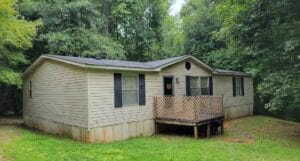
Understanding the Process of Converting a Manufactured Home to Real Property
Why homeowners choose to convert their manufactured homes to real property
Converting a mobile home into real property is a decision many homeowners make for various reasons. One common motivation is the desire to secure long-term stability and increase the value of their investment. By converting their mobile home, owners can obtain traditional mortgage financing, which may offer better interest rates and terms compared to personal property loans typically associated with mobile homes. This conversion also allows homeowners to establish permanent roots and gain a sense of permanence in their community.
Another reason for converting a manufactured home is related to zoning restrictions. In some areas, local regulations prohibit or restrict the placement of mobile homes on certain properties. By converting it into real property, homeowners can bypass these limitations and enjoy greater flexibility in choosing where they live.
Potential challenges and considerations involved in this process
While converting a mobile home into real property offers numerous benefits, there are several challenges and considerations that must be taken into account. One significant consideration is the cost associated with the conversion process itself. Homeowners should be prepared for expenses such as legal fees, title transfers, inspections, surveys, and potential upgrades required to meet building codes.
Homeowners should carefully evaluate whether their mobile home meets the necessary requirements for conversion. Some jurisdictions have specific criteria that must be met before granting real property status. These criteria may include factors such as foundation type, size restrictions, age limitations, or compliance with local building codes.
How this conversion affects ownership rights, taxes, and insurance coverage
Converting a manufactured home into real property impacts various aspects of homeownership rights, taxes, and insurance coverage. Once converted, the homeowner’s ownership rights change from personal property ownership to real estate ownership. This shift provides increased legal protection and potentially enhances marketability when selling the property in the future.
Regarding taxes, converted manufactured homes are subject to different tax assessments than personal property. Homeowners may benefit from lower property tax rates and potential eligibility for homestead exemptions or other tax incentives.
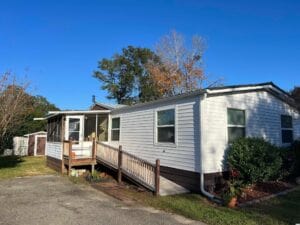
Insurance coverage is another consideration. While mobile homes typically require specialized insurance policies, converting to real property often allows homeowners to obtain standard homeowners’ insurance. This broader coverage can provide protection against a wider range of perils and liabilities.
If you are looking for insurance for your mobile home visit our page Mobile Home Insurance for more details.
Steps to convert a manufactured home to real property
Converting a manufactured home to real property involves several steps that need to be followed diligently. From initiating the process to obtaining the necessary permits and certifications, here’s a comprehensive guide on how you can successfully convert your mobile home into real property.
Initiate the conversion process
To initiate the conversion process, you’ll first need to contact your local government authorities or planning department. They will provide you with the specific requirements and guidelines for converting your mobile home into real property. Make sure to gather all the necessary information and documents they require before proceeding further.
Obtain necessary permits, inspections, and certifications
Once you have gathered all the required information, it’s time to obtain the necessary permits, inspections, and certifications. These ensure that your converted mobile home complies with local building codes and regulations. Some of the key steps in this stage include:
Permits: Apply for permits related to zoning, land use, construction, and any other requirements set by your local authorities.
Inspections: Schedule inspections at different stages of the conversion process to ensure compliance with safety standards.
Certifications: Obtain certifications such as HUD certification labels or state-issued insignias that validate your mobile home’s compliance with relevant standards.
Seek assistance from available resources
Throughout each stage of the conversion process, there are various resources available that can provide valuable assistance. These resources can help streamline your efforts and ensure a smoother transition from a mobile home to real property. Here are some options worth exploring:
Local agencies: Reach out to local housing agencies or organizations specializing in affordable housing for guidance on navigating through the conversion process.
Manufactured Housing Associations: Contact regional or national associations dedicated to manufactured housing for advice tailored specifically towards converting mobile homes.
Online forums and communities: Join online forums or communities where individuals who have gone through similar conversions share their experiences, tips, and recommendations.
Converting a mobile home to real property requires careful attention to detail and adherence to local regulations. By following the step-by-step instructions provided by your local authorities, obtaining the necessary permits and certifications, and seeking assistance from available resources, you can successfully complete the conversion process.
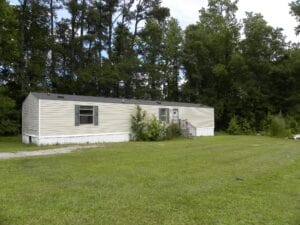
Remember that each locality may have specific requirements and procedures for converting mobile homes into real property. Therefore, it’s crucial to consult with your local government authorities or planning department throughout the entire process. With patience and proper guidance, you’ll be on your way to transforming your mobile home into a permanent piece of real estate.
Site Preparation and Responsibilities for Converting Mobile Homes to Real Property
Understanding what site preparation entails when converting a mobile home to real property is crucial. This process involves various aspects, including zoning requirements, foundation installation, and utilities connection. Let’s explore these factors in detail and identify who is responsible for each aspect of site preparation during the conversion.
Zoning Requirements
Before you can convert your mobile home to real property, it’s essential to check the zoning requirements in your area. Each state has its own regulations regarding where manufactured homes can be placed permanently. Contact your local office or department responsible for zoning to determine if your chosen location meets all the necessary criteria.
Foundation Installation: Converting a Mobile Home To Real Property
One of the primary steps in converting a mobile home to real property is installing a permanent foundation. This ensures stability and compliance with state installation standards. The foundation serves as the base on which the structure will rest securely. Common types of foundations include monolithic slabs, crawl spaces, and basements.
It’s important to hire professionals experienced in this specific task. They will ensure that the foundation meets all safety standards and provides a solid base for your converted home.
Utilities Connection
Connecting utilities such as water, electricity, and sewerage is another critical aspect of site preparation during the conversion process. Depending on your location and existing infrastructure, you may need to work with utility companies or contractors to facilitate these connections.
To avoid any issues or delays, make sure you understand all the requirements set by utility providers in your area. Some may require certain fees or consent before initiating utility connections.
Responsibilities: Converting Mobile Home to Real Property
During the conversion process from a mobile home to real property, different parties have specific responsibilities:
Homeowner: As the homeowner seeking this conversion, it is primarily your responsibility to ensure compliance with all legal requirements and obtain necessary permits.
Settlement Agent/Title Company: These entities play a vital role in handling paperwork related to the conversion. They facilitate the transfer of title, ensuring that all necessary documents are in place.
Contractors: Professionals hired for tasks such as foundation installation or utility connections have the responsibility to complete their work according to state standards and regulations.
Local Government: The local department responsible for zoning and building codes will review your plans and ensure compliance with all requirements.
By understanding these responsibilities, you can navigate the conversion process smoothly and avoid any potential setbacks.
Financing Options for Converting a Manufactured Home to Real Property
If you are considering converting your mobile home to real property, it’s important to explore the financing options available specifically for these types of properties. Luckily, there are loans, mortgages, and refinancing programs tailored towards manufactured homes that can help you achieve your goal.
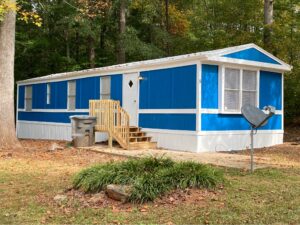
Loans and Mortgages for Manufactured Homes
There are various loan options you can consider. The Federal Housing Administration (FHA) offers loans specifically designed for manufactured homes through its Manufactured Housing Division. These FHA loans often come with lower down payment requirements and more flexible credit criteria compared to traditional mortgages.
Another option is to seek a conventional mortgage loan from a bank or lending institution. While these loans may have stricter requirements than FHA loans, they can still be used to finance the conversion of your mobile home. Keep in mind that interest rates and terms may vary depending on your creditworthiness and other factors.
Refinancing Programs
If you already own a mobile home that has been converted to real property but want better terms or lower monthly payments, refinancing could be an attractive option. By refinancing your existing loan, you can potentially secure a lower interest rate or extend the repayment period.
To refinance your manufactured home, you’ll typically need proof of ownership, income verification documents, credit history information, and an appraisal of the property’s current value. It’s essential to shop around and compare offers from different lenders to ensure you get the best deal possible.
Eligibility Criteria and Documentation
Regardless of whether you’re applying for a loan or seeking refinancing options, there are certain eligibility criteria and documentation requirements that lenders will expect you to fulfill:
Proof of ownership: You will need documents showing that you legally own the mobile home and that it has been converted to real property.
Income verification: Lenders will require proof of your income to assess your ability to repay the loan or refinance.
Credit history: Your credit score and history play a crucial role in determining the terms and interest rates you may qualify for. While some lenders are more lenient towards lower credit scores, maintaining good credit can increase your chances of securing favorable financing options.
Appraisal: An appraisal is typically required to determine the current value of the property. This helps lenders establish the loan amount or refinancing terms.
Fees and closing costs: Be prepared for additional fees associated with loans, such as origination fees, appraisal fees, title search fees, and closing costs.
By meeting these eligibility criteria and providing the necessary documentation, you’ll be well on your way to securing financing for converting your mobile home to real property.
Installation and Moving Considerations: Converting a Mobile Home to Real Property
Converting a mobile home to real property involves several important factors to consider. Whether you decide to hire professionals or take the DIY route, understanding local regulations and preferences is crucial. Being aware of any restrictions or guidelines regarding transportation and installation methods will ensure a smooth conversion process.
One of the first steps in the conversion process is finding an experienced installer who can handle the job efficiently. Look for professionals who specialize in mobile home conversions as they will have the necessary expertise to navigate through each stage of the conversion process. They can guide you on important aspects such as flooring improvements, which play a significant role in transforming your mobile home into real property.
DIY: Converting Mobile Home to Real Property
If you prefer a DIY approach, make sure you thoroughly research and understand all the steps involved in the installation process. While it may be tempting to save money by doing it yourself, keep in mind that certain tasks may require professional assistance due to safety concerns or legal requirements. Always prioritize your own safety and comply with local regulations.
When transporting your mobile home from its current location to its new destination, there are specific guidelines that need to be followed. Depending on your area’s regulations, you may need permits or approvals before moving your converted home. It’s essential to check with local authorities or transportation departments for any specific requirements.
Furthermore, some locations have restrictions on where manufactured homes can be placed. Factors such as zoning laws, neighborhood covenants, or homeowner association rules might influence where you can install your converted mobile home. Ensure that you choose a location that complies with all applicable regulations.
Another consideration is whether there are any existing liens on your mobile home that could complicate the conversion process. In accordance with local laws and regulations, it’s crucial to address any outstanding liens before proceeding with the conversion. This will help avoid potential legal issues down the line.
Understanding wind zone classifications is important. Wind zones indicate the level of wind resistance required for homes in specific areas. For instance, Wind Zone II requires higher wind resistance compared to Wind Zone I. Knowing your area’s wind zone will help you select the appropriate type of construction and ensure compliance with local regulations.
You might be interested in our article:
Discover Your Mobile Home Wind Zone
Conclusion: Converting a Mobile Home to Real Property
Congratulations on successfully converting your manufactured home to real property! By following the necessary steps and understanding the process, you have taken a significant step towards securing your investment and increasing its value.
Throughout this guide, we have discussed the key aspects involved in converting a manufactured home to real property. From understanding the feasibility of making your home real property to site preparation and financing options, we’ve covered it all. We’ve also highlighted important considerations such as installation and moving that play a crucial role in the conversion process.
Now that you have converted your mobile home into real property, it’s time to enjoy the benefits that come with it. You can rest assured knowing that your investment is more secure and likely to appreciate over time. Real property status provides stability, increased marketability, and potential tax advantages.
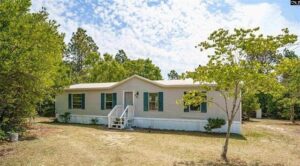
To make the most out of your converted home, ensure you stay updated with local regulations and requirements. Regular maintenance will help preserve its value, while periodic inspections can identify any issues before they become major problems.
Remember, if you ever decide to sell or refinance your converted home in the future, having proper documentation and records will be essential. Keep track of all relevant paperwork related to permits, titles, mortgages, insurance policies, and any improvements made.
If you still have questions or need further assistance regarding converting your manufactured home to real property, don’t hesitate to reach out to professionals in this field. They can provide personalized advice based on your specific circumstances.
Take pride in owning a piece of real estate that was once a mobile home. It’s an accomplishment worth celebrating!
FAQs: Converting a Mobile Home to Real Property
Can I convert my mobile home into real property if I don’t own the land?
Yes! Even if you don’t own the land where your mobile home is located, there are options available for converting it into real property. However, additional considerations may apply depending on factors such as lease agreements or park rules.
Will converting my mobile home to real property increase its value?
Yes, converting your mobile home to real property can potentially increase its value. Real property status typically adds stability and marketability to the home, making it more attractive to potential buyers or lenders.
What financing options are available for converting a manufactured home?
Financing options for converting a manufactured home to real property may include conventional mortgages, FHA loans, or specialized programs offered by lenders. It’s important to explore different options and consult with mortgage professionals to find the best fit for your situation.
Are there any tax advantages associated with converting my mobile home into real property?
In some cases, there may be tax advantages associated with converting a mobile home into real property. These can vary depending on local regulations and individual circumstances. Consulting with a tax professional will help you understand any potential benefits.
How long does the process of converting a manufactured home to real property take?
The timeline for converting a manufactured home to real property can vary based on several factors such as local regulations, permit processing times, and the complexity of site preparation. It’s advisable to start the process early and allow sufficient time for all necessary steps.
These FAQs address some common concerns regarding converting mobile homes into real property. If you have additional questions or need further information, don’t hesitate to seek expert advice from professionals in this field.
You might also be interested in our articles:
Rent to Own Mobile Homes: How it Works

